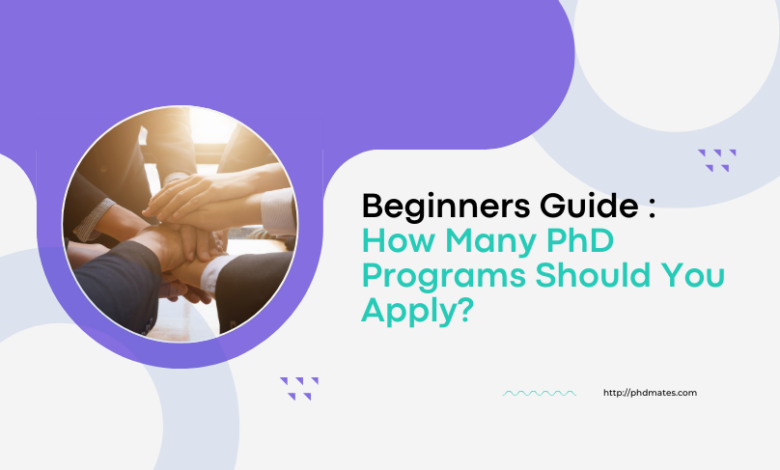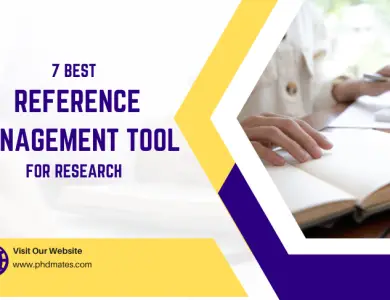Beginners Guide: How Many PhD Programs Should You Apply?
Successfully Get Admitted to PhD Program

Well, Congratulations! on making up your mind to pursue a PhD program. I guess most of you have just graduated from your master’s degree or are in your last year of the master’s program, and you are looking forward to applying for a PhD. One of the most important questions that arises is – How many PhD programs should I apply to?
If you’re feeling confused about the application process for a PhD, this article has everything you need to know. I’ve also included some additional tips that could make your application even stronger.
How many PhD programs should you apply to?
You can apply for multiple PhD programs at various universities, but you can only be admitted to one PhD program. Most PhD students apply to 10 programs and are admitted to at least one of them.
A general rule of thumb should be to apply for 5 PhD programs, with 3 based on the best institutes or universities and 2 based on convenience. The motivation for applying to multiple PhD programs is to secure admission to the best university to pursue your doctoral degree.
I’ve encountered PhD scholars who applied to a single top-tier university and were admitted, while others applied to multiple programs and were admitted to only one. Several factors influence your PhD application, including your academic record, research experience, PhD proposal, and cover letter.
In this article, we’ll discuss strategies to apply to a minimum number of PhD programs and increase your chances of getting shortlisted for a maximum number of programs.
Contents
Requirements of PhD
The basic requirement for a PhD is to have a master’s degree in a relevant field. Other requirements may vary from university to university, such as having GATE or GRE scores. If you are applying for a PhD in the US, UK, or Europe and come from a country where the native language is not English, you are required to take the IELTS or TOEFL exam.
| Category | Necessary Requirements | Recommended/Preferred Requirements |
|---|---|---|
| Academic Background | Master’s degree or equivalent, preferably in a relevant field | Having multidisciplinary degree will also help you |
| GPA and Academic Performance | Minimum 3.0 GPA (4.0 scale) | Having better GPA will get you more attention |
| Standardized Tests | No standardized test scores required, but some programs may require GRE/GMAT/LSAT | Strong scores on standardized tests like GRE (GMAT score is not always a requirement) |
| Letters of Recommendation | 2-3 letters from academic or professional mentors | Additional letters of recommendation from research experience supervisors or relevant industry professionals |
| Personal Statement/Statement of Purpose | Clear, concise, and well-written statement outlining research interests and goals | Provide a detailed explanation of your research objectives, background, and motivation for pursuing a PhD. Your research proposal would be an additional component. |
| Research Experience | Research experience in the field (internships, co-op programs, research assistantships) | Significant research experience, such as publications or presentations at conferences. If you have any prior experience in working on a research project. |
| Language Proficiency | English language proficiency test scores (e.g., TOEFL/IELTS) | Fluency in both written and spoken languages, along with high proficiency scores, is a prerequisite for students from non-English-speaking countries. A minimum of 7th grade in the IETS is recommended. |
| Additional Requirements | Proof of funding or scholarship support | International students: proof of health insurance, visa sponsorship, or tuition fee waiver |
Choosing the Best university
When it comes to pursuing a PhD, aiming for top-tier universities is crucial. I advise against setting limitations when choosing a university. One of the most valuable steps in your university search is to examine the QS Ranking of that university.
Additionally, some universities specialize in specific areas of study. For instance, if you’re interested in pursuing a PhD in Literature, you might consider Harvard or Cambridge. However, if you’re passionate about Chemical Engineering, you should consider the Massachusetts Institute of Technology (MIT).
Lastly, the location of the university should also be a factor to consider.
Application Fees
Most of the PhD programme applications, do not come with any application fees. However, few of the universities may have application fees ranging between $50 and $100.
How to fund your PhD?
In terms of funding or fees, there are three types of PhD programs: fully funded, self-funded, and tuition fee-funded. In a fully funded program, all costs related to tuition fees and application fees are covered, and it also comes with a stipend. In a self-funded program, you will have to cover all costs. In a tuition fee-funded program, only tuition fees will be covered.
Most PhD programs are fully funded, meaning all of your fees are covered, and you also receive a monthly stipend. In the UK, the stipend is regulated by UKRI, with an average of about £19,237, while in the US, the stipend is approximately $20,000.
Some universities may allow students to work part-time or serve as teaching assistants.
Increase the Chances of Getting Admitted to PhD Program
There are various ways to increase your chances of getting admitted into a PhD program. This video is also an excellent example of how you can successfully get admission in PhD –
1. Getting into the MRes + PhD Program
You can apply for the MRes (Master of Research) + PhD program after your graduation. This is a dual program in which you complete your master’s and begin with your doctoral program. This is the easiest way to get into a PhD.
Most of the MRes + PhD programs are fully funded opportunities. MRes prepares you with a background in research which you can carry forward for your PhD.
2. Publishing Research Paper
Publishing a research paper, even before entering a PhD program, would be very beneficial. By working on a paper, you will demonstrate your capabilities in the research field. Additionally, it doesn’t matter whether you publish the research paper as a second or third author.
The best way to get this done is to work with your professors while you’re pursuing a master’s degree. Several of your professors would be working on some kind of research and may require some kind of assistance. you can be the one to assist and finally publish the research paper with your professor. This experience will definitely be an great addition to yourself as well.
3. Good letters of recommendations
Getting a strong recommendation letter from professors, fellow researchers or academicians will help in getting admitted. Someone who has a good academic position background in the field of study would be your preference to get good letters of recommendation. Your professor could also be the one who could give you a letter of recommendation.
While applying for PhD, every application demands a letter of recommendation. This is the most influencing part of your PhD application. For this, you need to have a good network and this network could be achieved by attending various seminars, workshops, research conferences, etc.
4. Social work experience.
Although social work experience is not mandatory, having some experience in this field will help you create a positive profile. You could make a small social contribution or work with an NGO. We need to include every positive aspect to increase our chances of getting our application shortlisted.
5. Strong research proposal
It may take some time and research, resulting in a lot of reading, to develop a strong research proposal. One of the main reasons why your application may be rejected is due to having a poor research proposal. The supervisor will always select a PhD candidate who is capable of conducting research, and this can be identified by your research proposal.
Your research proposal should have a valid research topic and should also be something that you are interested in. Remember that when you come up with a research proposal, you will be working on that particular study until you complete your PhD. so it is very much important that you should choose something that will keep you engaged.
6. Find suitable PhD positions
You should always stay updated about the latest PhD opportunities that are available. Keep track of university websites for all the open opportunities that you can apply to. Another way to stay informed about PhD opportunities is through findaphd.com.
Sometimes when a PhD position is not updated, you may directly approach the admission department of the university by email or also could email a supervisor from that University. I knew a few people who had directly emailed a supervisor about any openings and they got through.
7. Reach out to supervisor or faculty
Another way that could increase your chances of getting admitted is to approach the supervisor or faculty member of that particular university. You can reach out to them on LinkedIn or email, this way you build up a conversation and have your thoughts exchanged.
Another suggestion is to read out the research papers that were published by the supervisor or the faculty. This way you get to know their interest and could also establish your PhD topic around their interest.
How many years does it take to complete PhD?
On average, it takes a PhD student around 3 to 4 years to finish their degree. But the minimum time for any PhD program is usually 3 years. If you need more time than that, you can ask the university for an extension. Most stipends are usually paid for 3 years.
In summary
To all individuals considering applying for a PhD program, I strongly recommend conducting comprehensive research in your chosen field of study. Select a reputable university that aligns with your academic goals. Prepare a well-crafted proposal and persist in your application process.
The most measurable way is to apply for five PhD programs out of which three should be the best universities and the other two should be based on your convenience.
PhD programs that are fully funded are competitive, as many international students apply. However, it is relatively easier to get admitted if you are applying for a self-funded PhD program.
If there are any other varied thoughts or opinions. Please list them in the comment section. I would be very glad to respond.
